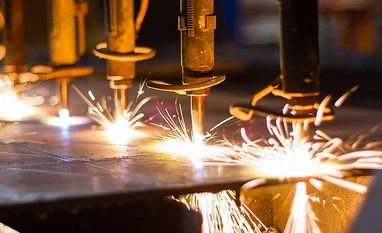Domestic aluminium producers have asked the government to introduce minimum import price (MIP) to check cheap imports of unwrought aluminium and scrap from China and West Asia.
MIP is the minimum price per tonne that Indian firms have to pay while importing products into the country.
China’s state-protected smelters, which thrive on huge subsidies, have been dumping cheap aluminium products to India, where aluminium demand is on the rise. India currently meets 51 per cent of its demand through imports.
Another key concern of domestic aluminium makers is that the import duty on some key ingredients used for aluminium manufacturing is higher than the primary metal itself. While primary aluminium is taxed at five per cent, caustic soda and aluminium fluoride attract a duty of 7.5 per cent.
Coal-tar pitch comes with an import duty of five per cent. Together, alumina, coal-tar pitch and aluminium fluoride have a 44 per cent share in aluminium production cost. Doing away with the inverted duty structure can help save costs up to $40 million a year, say aluminium makers. They point out that some of the top aluminium-producing countries and regions such as China, Brazil, the US and European Union do not have the concept of an inverted duty. The logistics cost for aluminium making in the country is 20 per cent of the metal production cost compared with nine per cent in West Asia.
Also, rail freight for alumina is higher because it is clubbed with metals. Experts say freight charges could be brought down by placing it under the raw material category.
MIP is the minimum price per tonne that Indian firms have to pay while importing products into the country.
China’s state-protected smelters, which thrive on huge subsidies, have been dumping cheap aluminium products to India, where aluminium demand is on the rise. India currently meets 51 per cent of its demand through imports.
More From This Section
“Our Budget wishlist rests on MIP and removal of the inverted duty structure. We have called for removing the anti-dumping duty on caustic soda imports. Also, the railway freight on alumina needs to come down by changing its classification. Despite being an intermediate product, alumina is treated as a metal in the list of commodities attracting rail freight,” said T K Chand, chairman of National Aluminium Company and president of the Aluminium Association of India.
Another key concern of domestic aluminium makers is that the import duty on some key ingredients used for aluminium manufacturing is higher than the primary metal itself. While primary aluminium is taxed at five per cent, caustic soda and aluminium fluoride attract a duty of 7.5 per cent.
Coal-tar pitch comes with an import duty of five per cent. Together, alumina, coal-tar pitch and aluminium fluoride have a 44 per cent share in aluminium production cost. Doing away with the inverted duty structure can help save costs up to $40 million a year, say aluminium makers. They point out that some of the top aluminium-producing countries and regions such as China, Brazil, the US and European Union do not have the concept of an inverted duty. The logistics cost for aluminium making in the country is 20 per cent of the metal production cost compared with nine per cent in West Asia.
Also, rail freight for alumina is higher because it is clubbed with metals. Experts say freight charges could be brought down by placing it under the raw material category.
)